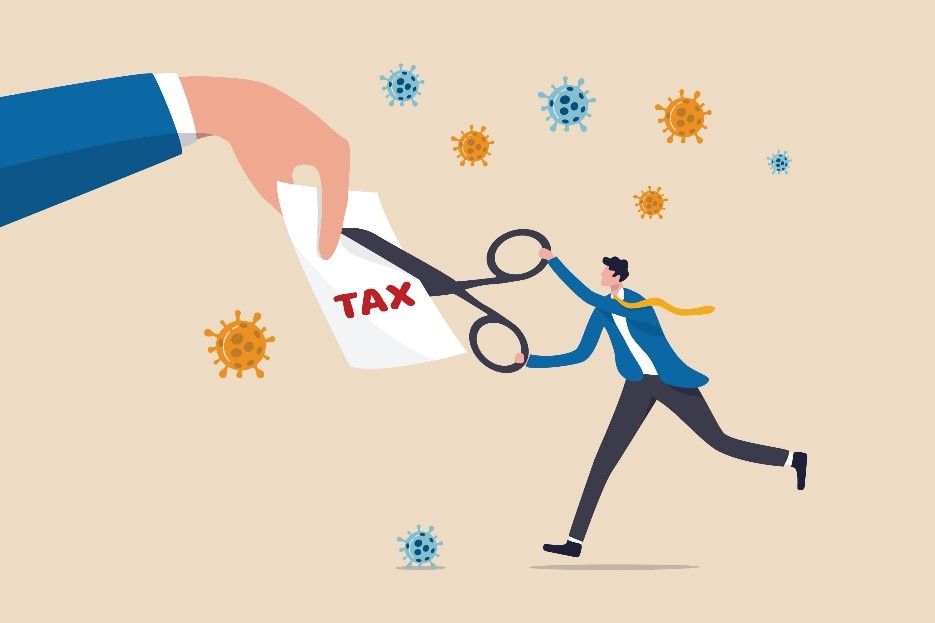How IRS Can Help Business Owners Hurt by COVID Disaster

How IRS Can Help Business Owners Hurt by COVID Disaster Quick Summary:
Disaster Area Declaration – Internal Revenue Code Sec. 165(i)
-
- Disaster losses in the current year can be taken on a prior year’s return (i.e., 2020 losses stemming from COVID-2019 can be taken on the 2019 return)
- The loss/deduction would need to be substantiated by a qualified valuation
- The Loss is limited to your adjusted tax basis in the entity or business LESS any insurance proceeds received
Detailed Discussion:
We’d like to bring to your attention the possible opportunity to claim a loss and obtain a refund of prior year taxes by claiming a “Disaster Loss” under Internal Revenue Code Sec. 165(i) and claim it in your 2019 tax returns (the ones due in the coming months). That is, you don’t have to wait until 2021 to claim a loss that occurs in 2020. This is not novel…the IRS allows this often for taxpayers affected by hurricanes and other natural disasters.
Note, a loss is allowed for the unrealized decrease in the fair market value of your business. This is beyond deductions you are already claiming for normal expenses.
This can reduce the tax due (or increase a refund) for your business for 2019, and if the loss is large enough, may create an opportunity to claim a Net Operating Loss (“NOL”) “carryback” to get a refund of pre-2019 taxes. NOL carrybacks were repealed in the 2017 tax act, but have been re-enacted in the recent CARES Act.
Steps:
1) Get going on preparing your 2019 business tax returns.
2) Obtain a “business valuation” documenting the decrease in fair market value (due to the resulting decrease in income) before and after the President declared your state a disaster area in 2020. The loss is limited to your tax basis (happy to discuss).
3) Compute and report the allowable Disaster loss on your 2019 business tax returns – there are a few steps to that which I won’t cover here.
4) Therefore, reduce your 2019 taxable income by the allowable Disaster Loss.
5) File your 2019 business tax return and obtain a refund of any estimated tax payments that result in an overpayment of 2019 taxes.
6) Wait 30 days or so before filing #7, for the IRS to get your 2019 tax return (claiming the loss) recorded in their computer system, before filing any carryback claim for years prior to 2019…or else the IRS will not be able to find the 2019 loss in their records which you may be, in part, claiming in prior years.
7) If the allowable loss exceeded your 2019 taxable income, prepare a carryback claim, IRS Form 1045 https://www.irs.gov/pub/irs-pdf/f1045.pdf, or an amended return (for various types of entities) to deduct the remaining loss and claim a refund of prior year taxes until the Disaster Loss has all been absorbed (utilized) to offset prior year taxable income. The calculation of the amount of allowable loss carryback is subject to a number of adjustments that need to be reviewed.
8) Repeat for California with the California Franchise Tax Board, as they generally conform to Federal rules in this area. CA rules (or your state) should be reviewed in detail! States may be in the process of amending their laws.
9) Refunds of Federal tax are not taxable. Refunds of state income tax may be subject to federal tax (as they are the re-payment of amounts previously deducted for state taxes).
10) In small businesses, a formal “valuation” may not be necessary, but some type of professional calculation of the decrease in fair market value is required. The IRS has rules on the type of documentation that is required, and they should be reviewed.
11) The loss claimed will reduce your adjusted basis in your business. That may increase your taxable gain in the future when you sell your business…but I assume most people are not worried about that, right now.
12) Those of you who prepare GAAP financial statements, may have to consider a write-off of Goodwill. Way too much to discuss, here.
Expectations about Time Frame:
- a) It is not easy or inexpensive to get a business valuation to document the decrease in value. We can help point you in the right direction. The process is similar to a small financial audit.
- b) It is not quick or easy to prepare and file a Form 1045 or an amended tax return to claim the Disaster Losses.
- c) The IRS will take up to 6 months to process and approve the refund claims. If there is a title wave of claims filed, the processing will get slower.
- d) The California Franchise Tax Board is simply awful processing amended returns – we’ve seen it take over a year!
But it may all be worth doing, given the size of losses occurring.
President’s Disaster Declaration:
“On March 13, 2020, the President declared the ongoing Coronavirus Disease 2019 (COVID-19) pandemic of sufficient severity and magnitude to warrant an emergency declaration for all states, tribes, territories, and the District of Columbia pursuant to section 501 (b) of the Robert T. Stafford Disaster Relief and Emergency Assistance Act, 42 U.S.C. 5121-5207 (the “Stafford Act”). State, Territorial, Tribal, local government entities and certain private non-profit (PNP) organizations are eligible to apply for Public Assistance.” https://www.fema.gov/news-release/2020/03/13/covid-19-emergency-declaration
Internal Revenue Code Sec. 165
(i)Disaster losses
(1)Election to take deduction for preceding year
Notwithstanding the provisions of subsection (a), any loss occurring in a disaster area and attributable to a federally declared disaster may, at the election of the taxpayer, be taken into account for the taxable year immediately preceding the taxable year in which the disaster occurred.
(2)Year of loss
If an election is made under this subsection, the casualty resulting in the loss shall be treated for purposes of this title as having occurred in the taxable year for which the deduction is claimed.
(3)Amount of loss
The amount of the loss taken into account in the preceding taxable year by reason of paragraph (1) shall not exceed the uncompensated amount determined on the basis of the facts existing at the date the taxpayer claims the loss.
(4)Use of disaster loan appraisals to establish amount of loss
Nothing in this title shall be construed to prohibit the Secretary from prescribing regulations or other guidance under which an appraisal for the purpose of obtaining a loan of Federal funds or a loan guarantee from the Federal Government as a result of a federally declared disaster may be used to establish the amount of any loss described in paragraph (1) or (2).
(5)Federally declared disasters
For purposes of this subsection—
(A)In general
The term “Federally [1] declared disaster” means any disaster subsequently determined by the President of the United States to warrant assistance by the Federal Government under the Robert T. Stafford Disaster Relief and Emergency Assistance Act.
(B)Disaster area
The term “disaster area” means the area so determined to warrant such assistance.
We hope you found this article about how IRS can help business owners hurt by COVID disaster helpful. If you have questions or need expert tax or family office advice that’s refreshingly objective (we never sell investments), please contact us or visit our Family office page or our website at www.GROCO.com. Unfortunately, we no longer give advice to other tax professionals gratis.
To receive our free newsletter, contact us here.
Subscribe to our YouTube Channel for more updates.
Considerately yours,
GROCO, GROCO Tax, GROCO Technology, GROCO Advisory Services, GROCO Consulting Services, GROCO Relationship Services, GROCO Consulting/Advisory Services, GROCO Family Office Wealth, and GROCO Family Office Services.

A proud sponsor of the American Dreams Show

The Jelly Belly Legacy | Herman G Rowland
Episode Transcript of: The Jelly Belly Legacy | Herman G Rowland Alan Welcome back. I’m here today visiting with Pam rollin. He’s the chairman of the board of the Jelly Belly company here in Fairfield, California. Welcome to today’s show. Herman Thank you, Alan. Glad to be here. Alan So tell me your background,…
State of the Valley | Roger Royse
State of the Valley | Roger Royse Transcript: Welcome to American Dreams keys to success with your host, Alan Olsen. Alan 0:05 Welcome back. I’m here today speaking with Russell Hancock. He’s the president and CEO of joint ventures, Silicon Valley. Welcome to today’s show. Thank you. Delighted to be Russell, give me some background…
Top Ten Tax Time Tips
Top Ten Tax Time Tips Source: IRS.gov 1/20/2009 While the tax filing deadline is more than three months away, it always seems to be here before you know it. Here are the Internal Revenue Service’s top 10 tips that will help your tax filing process run smoother than ever this year. Start gathering your records…
Mutual Funds and Tax Benefits
Mutual Funds and Tax Benefits What are the tax benefits available to those who invest in mutual funds? What are the tax liabilities, if any? Since, April 1, 2003, all dividends, declared by debt-oriented mutual funds (i.e. mutual funds with less than 50% of assets in equities), are tax-free in the hands of the investor.…



